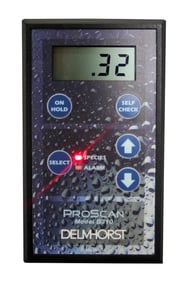A high-quality, accurate moisture meter is an incredibly useful tool for craftsmen that frequently work with wood. In many ways, moisture meters can be a craftsman’s best investment.
Why are moisture meters such a great investment? Here are a few reasons:
1: Moisture Meters Can Save You Money
It happens sooner or later to any woodworker or craftsman: you buy a load of lumber, only to find out later that it has some severe moisture-related problems that weren’t visible at first.
Wood that has too much (or too little) moisture might not show any outward signs of damage initially. However, as time passes, the wood may swell, shrink, or split because of hidden moisture problems.
Moisture meters can help you save money on buying bad lumber by letting you check the moisture content of the wood before you start to work with it. Once you know there’s a problem with the moisture, you can fix it or return it at your discretion.
2: Moisture Meters Help Ensure Quality
 Aside from just detecting if wood’s moisture content is extremely off, moisture meters can help you improve the overall quality of your project.
Aside from just detecting if wood’s moisture content is extremely off, moisture meters can help you improve the overall quality of your project.
For example, if the moisture content of the wood you’re working with is just a little bit too high, using a moisture meter will let you know by how much. This gives you an indication of how much time will be needed to dry out the wood before you can use it.
By ensuring that the wood you work with is at the right %MC, you can avoid some of the subtler issues that high moisture content can cause, such as excess moisture preventing adhesive bonds or causing paint to bubble.
This results in a stronger, better-looking piece of finished piece.
Aside from helping you save money and improve quality for woodwork, moisture meters can be put to many other uses.
Other Uses for a Wood Moisture Meter
There are many different kinds of moisture meters on the market. Some of these meters have functions that go far beyond just checking moisture in one type of wood.
In addition to checking raw wood, some moisture meters can check moisture in drywall, insulation, flooring, and other building materials. Many meters that aren’t specifically calibrated to provide a quantitative check these materials may still have a “reference” mode that can provide a general, qualitative measurement.
This greatly expands the utility of a moisture meter beyond just checking moisture in your woodwork. Such versatility helps you get more value out of your moisture meter—making it an even better investment.
Need help finding the right moisture meter for your woodworking project? Check out some of our free resources about moisture meters now!

Comments